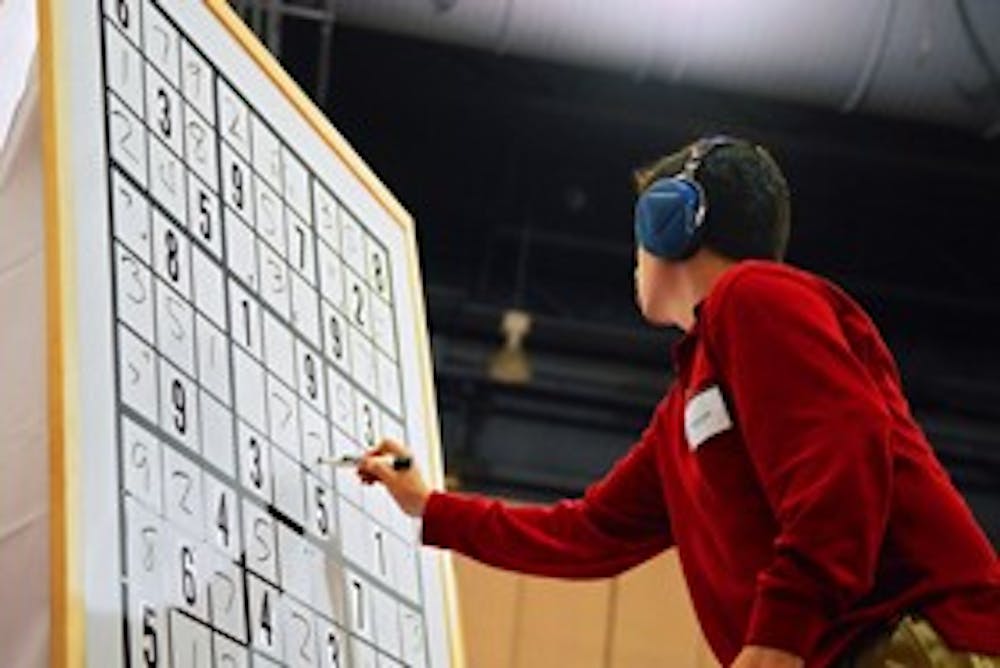
The players assembled Saturday morning, game faces on, adrenaline pumping and pencils sharpened.
No, it wasn’t this year’s crop of high school seniors preparing to take the SATs — these competitors had much more at stake. It was the Philadelphia Inquirer’s National Sudoku Championship, hosted by none other than America’s puzzle master Will Shortz.
Shortz, editor of the New York Times Crossword Puzzle, gained national fame after the 2006 release of Wordplay, a documentary which chronicles the American Crossword Puzzle Tournament that he started in 1978.
But with different puzzles at hand, the Sudoku championship has little in common with its crossword counterpart.
“There’s more to talk about a crossword,” Shortz said. “At the highest level, Sudoku solvers can discuss strategy, but not much else.”
But between the five rounds of intense solving at the Philadelphia Convention Center, the 646 competitors discussed strategy, difficulty and competition from years past — and Thomas Snyder.
A cult hero among Sudoku fans, Snyder won the inaugural championship in 2007. He returned to the advanced section finals this year, finishing his puzzle first with an astonishing sub-5 minute time.
Snyder removed his headphones — officially required by rule to block outside noise — signaling he had finished, and dropped them dramatically on the stage floor.
A crowd of photographers swarmed the 27-year old Stanford University bioengineer as he sat in front of his oversized puzzle. Sitting cross-legged, he held up a copy of Mutant Sudoku, a book of puzzles he wrote with 2008 champion Wei-Hua Huang.
To his right, Tammy McLeod, a three-time finalist, and Eugene Varshavsky continued to fill their cells, well aware of Snyder’s quick finish, competing for consolation money — or so they thought.
After McLeod finished, several minutes behind Snyder, the two discussed puzzle strategy, looking at his board. Varshavsky accepted a third-place finish, as Shortz took the podium.
While announcing the winners, Snyder interrupted Shortz — “My board has three errors on it; Tammy won.”
Astonished, Shortz and German puzzle-maker Stefan Heine confirmed the result.
“The tournament goes so fast,” Snyder said earlier during his lunch break, after he had secured his spot in the final round.
“You’re sprinting to a finish,” he added. “It’s not the way most people experience a puzzle.”
Just two hours later in the finals, McLeod proved that slow and steady really does win the race — as well as $10,000 and a spot on the U.S. team at the World Puzzle Championship, which will be in Philadelphia in April 2010.
“I still wasn’t absolutely certain. It took a few minutes to sink in,” McLeod said after seeing Snyder’s board. “I was pleasantly shocked.”
After recouping her travel expenses, McLeod, a 32-year old Los Angeles resident, said her winnings would go into the bank, saving for her 18-month old baby’s future.
This year was McLeod’s third appearance in the final round, finishing in third place last year.
In just three years, the National Sudoku Championship has become the country’s largest puzzle championship, according to organizers.
Competitors are split into beginning, intermediate and advanced levels based on personal choice, and compete in age and geographical categories, solving 11 puzzles before the day-long competition is over.
The digit-based puzzle has quickly become popular in publications nationwide.
“Part of the appeal is the simplicity of instructions,” Shortz said. “Yet each puzzle has great depth — some level appeals to everybody.”
Saturday’s solvers ranged in age from eight to 93 years old.
Brian Tierney, CEO of Philadelphia Media Holdings, publisher of The Philadelphia Inquirer and self-professed “airplane solver,” was on hand to dole out oversized checks to the winners of each skill level.
“We love bringing people from all over,” said Tierney, who graduated from Penn in 1979. This year’s championship featured solvers from 23 states and Canada.
“It’s a great way to show off the city,” he said.
Tierney and Shortz secured Philadelphia’s 2010 bid for the World Puzzle Championships after presenting to the assembly of the World Puzzle Federation two years ago.
At last year’s World Championships, Snyder roomed with 2008 U.S. Champion Wei-Hua Huang. Despite being competitors, they are also good friends.
“It’s as much a gathering of friends as a competition,” Snyder said.
“Yeah, there are puzzles and winners too, but Sudoku is typically a solitary experience — here it is a social one too.”
The Daily Pennsylvanian is an independent, student-run newspaper. Please consider making a donation to support the coverage that shapes the University. Your generosity ensures a future of strong journalism at Penn.
DonatePlease note All comments are eligible for publication in The Daily Pennsylvanian.







